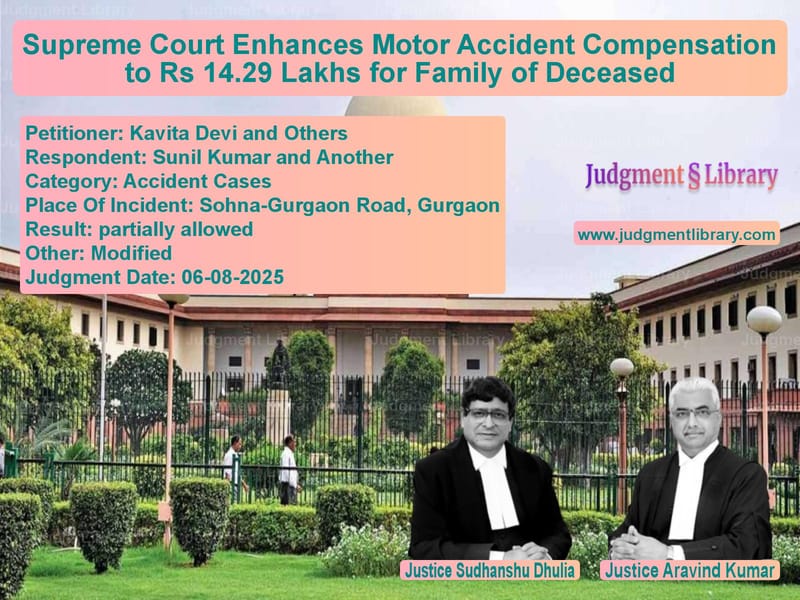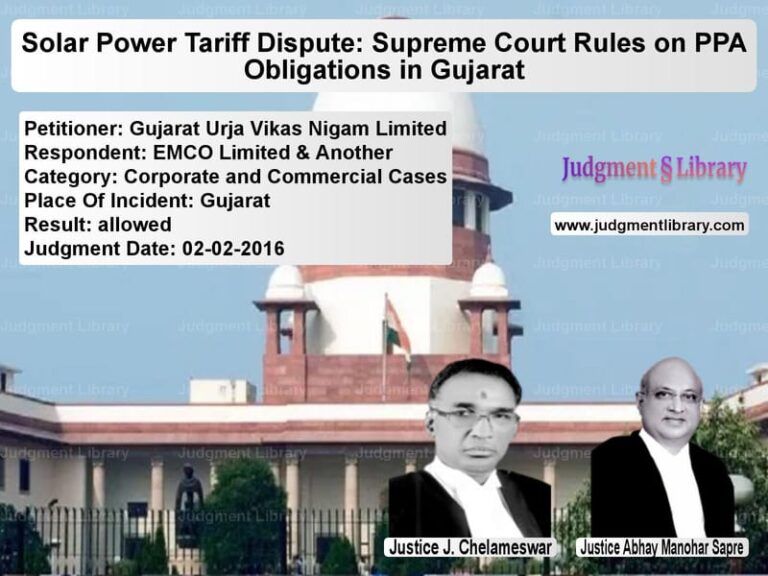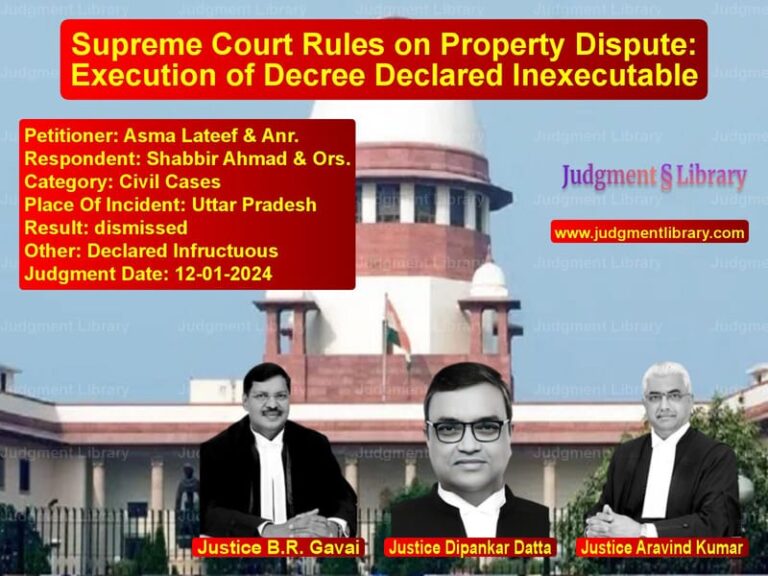Supreme Court Enhances Motor Accident Compensation to Rs 14.29 Lakhs for Family of Deceased
In a significant ruling that emphasizes the importance of providing just compensation to victims of road accidents, the Supreme Court of India has substantially enhanced the compensation awarded to a family who lost their sole breadwinner in a tragic road accident. The judgment, delivered on August 6, 2025, provides important clarity on how income should be calculated for compensation purposes and reinforces the principle that compensation must reflect the actual financial loss suffered by dependents.
The case involved Kavita Devi and her two minor children, who lost their husband and father, Lokender Kumar, in a fatal road accident that occurred on February 16, 2009. The tragedy struck at around 7:00 AM when Lokender Kumar was proceeding to his office in Gurgaon. As he reached Angana Restaurant on Sohna-Gurgaon Road, a Santro car driven rashly and negligently by respondent No. 1 hit him, causing severe injuries that proved fatal at the spot.
The legal journey for the grieving family began when they filed a claim petition before the Motor Accident Claims Tribunal in Gurgaon seeking compensation of Rs. 25,00,000. The Tribunal, in its award dated April 12, 2010, awarded only Rs. 2,54,720 with 7% annual interest. Dissatisfied with this amount, the claimants approached the Punjab and Haryana High Court, which enhanced the compensation to Rs. 7,23,680. Still feeling that this amount didn’t adequately compensate their loss, the family approached the Supreme Court seeking further enhancement.
During the Supreme Court proceedings, Mr. Fuzail Ahmad Ayyubi, learned counsel for the appellants, presented several key arguments. He contended that the impugned order has not considered the judgment of the Constitution Bench in National India Insurance Company Limited v. Pranay Sethi and Others. Whereunder this Court held Rs. 15,000/- each is to be awarded under the conventional heads of funeral expenses and loss of estate, and further held that Rs. 40,000/- has to be added under the head of loss of consortium. The High Court has awarded a total of Rs. 20,000/- under all the above-mentioned heads therefore the compensation should be enhanced.
He further argued that in spite of the production of the Salary Certificate as Ex. P6, the Tribunal as well as the High Court has ignored the fact that the deceased was earning Rs. 6,500/- per month therefore the Courts below erred in not considering the same and considering the fact that wife and two minor children are the claimants whole Rs. 6,500/- must be considered as the income of the deceased for computation of the compensation. Additionally, he pointed out that both the Tribunal and the High Court has not considered the aspect of Agricultural Income at all. Therefore, the Claimants are entitled to enhancement of compensation after the income from agriculture is added to Rs. 6,500/-.
Ms. Suman Bagga, counsel appearing for the Insurance Company, supported the impugned order and sought for the dismissal of the Appeal.
The Supreme Court, after careful consideration of the material on record and submissions from both sides, found that though the High Court had enhanced the compensation, the amount was still on the lower side. The Court identified several key issues that needed reconsideration.
The central dispute revolved around the actual income of the deceased. The claimants had produced a salary slip (Ex. P6) showing that Lokender Kumar was earning Rs. 6,500 per month from his job at R.M. Manpower Services. However, the Tribunal had reduced this amount to Rs. 3,665 per month by excluding house rent allowance and other allowances, citing discrepancies in ESI Form 6 and Form 6A.
The Supreme Court strongly criticized this approach, describing it as based on hyper technicality. The Court emphasized that for computation purposes, the actual income of the deceased has to be taken into consideration. In its analysis, the Court referenced its earlier judgment in National Insurance Co. Ltd. v. Indira Srivastava and Others, where it was held that The term ‘income’ has different connotations for different purposes. A court of law, having regard to the change in societal conditions must consider the question not only having regard to pay packet the employee carries home at the end of the month but also other perks which are beneficial to the members of the entire family. Loss caused to the family on a death of a near and dear one can hardly be compensated on monetary terms.
The Court further elaborated on this principle, noting that Section 168 of the Act uses the word ‘just compensation’ which, in our opinion, should be assigned a broad meaning. We cannot, in determining the issue involved in the matter, lose sight of the fact that the private sector companies in place of introducing a pension scheme takes recourse to payment of contributory Provident Fund, Gratuity and other perks to attract the people who are efficient and hard working. Different offers made to an officer by the employer, same may be either for the benefit of the employee himself or for the benefit of the entire family. If some facilities are being provided whereby the entire family stands to benefit, the same, in our opinion, must be held to be relevant for the purpose of computation of total income on the basis whereof the amount of compensation payable for the death of the kith and kin of the applicants is required to be determined.
The Court provided clear guidance on how to handle allowances while computing income: This Court has consistently held in case of the allowances which are included in the component of salary of the deceased, Tribunal has to take into consideration these allowances as they were used for supporting the family. The claimants have to show that these allowances were regularly received and used for the family’s benefit. Further, while determining whether the allowances form a part of the salary or not, the Tribunal by looking into the facts of each case and by considering the extent of dependency of the claimants on the salary of the deceased including the allowances, have to determine whether these allowances should be excluded from determination of the income of the deceased. If the answer of the Tribunal is in affirmative, then the allowances may be excluded for determination of loss of dependency. If the Tribunal answers the above point in negative, then the Tribunal has to include the allowances for computation of income of the deceased, thus determining the loss of dependency.
Applying these principles to the case at hand, the Court found that the claimants had consistently pleaded that the deceased was earning Rs. 6,500, supported by Ex. P6, and the respondents had produced no contrary evidence to dispute that allowances should be excluded. The Court also noted the changed economic situation of the family after the death, with the entire burden of caring for two minor children falling on appellant No. 1.
The Court then proceeded with the fresh computation of compensation. Applying the principles laid down in Sarla Verma v. Delhi Transport Corporation, which was affirmed by the Constitution Bench in Pranay Sethi, the Court determined that out of Rs. 6,500, one-third (Rs. 2,167) should be deducted for the personal expenses of the deceased, leaving Rs. 4,333 as the monthly contribution to the family. Considering the deceased was 35 years old, the Court added 50% future prospects (Rs. 2,167), bringing the monthly income to Rs. 6,500. Using the appropriate multiplier of 16 for the age group 31-35 years, the Court awarded Rs. 12,48,000 under the head of loss of dependency.
For conventional heads, the Court awarded Rs. 18,150 each for loss of estate and funeral expenses. Following the precedent set in Magma General Insurance Company Limited v. Nanu Ram, the Court awarded Rs. 48,400 to appellant No. 1 under the head of spousal consortium and Rs. 48,400 each to appellant Nos. 2 and 3 under the head of parental consortium.
The total compensation awarded amounted to Rs. 14,29,500, distributed across various heads. However, considering that the appeal was filed after a delay of 1855 days with an additional 75 days delay in refiling, the Court directed that the respondents would not be liable to pay interest for this delay period.
The Court gave specific directions for disbursement of the compensation. Respondent No. 3 was directed to deposit Rs. 14,29,500 with 7% interest per annum from the date of filing the petition till deposit (excluding the delay period) before the jurisdictional Tribunal within 8 weeks. The compensation was to be distributed among the claimants in the ratio of 50:25:25, with claimant No. 1 (the wife) receiving 50%, and claimant Nos. 2 and 3 (the children) receiving 25% each. The amount awarded to the minor children was directed to be kept in fixed deposits in any nationalized bank, with claimant No. 1 entitled to receive periodical interest for the benefit of the children.
This judgment serves as an important reminder that courts should take a practical and compassionate approach while computing compensation in motor accident cases. The Supreme Court’s emphasis on considering the actual income including allowances, rather than getting caught in technicalities, ensures that families who lose their breadwinners receive compensation that truly reflects their loss. The ruling also reinforces the principle that compensation should be just and adequate to help dependents maintain a standard of living similar to what they would have enjoyed if the accident had not occurred.
The Court’s detailed reasoning provides valuable guidance for lower courts and tribunals in handling similar cases, ensuring that the spirit of the Motor Vehicles Act – to provide speedy and substantial relief to accident victims – is upheld. By enhancing the compensation from Rs. 7,23,680 to Rs. 14,29,500, the Supreme Court has not only provided much-needed relief to the grieving family but also set an important precedent for fair compensation calculation in motor accident cases.
Petitioner Name: Kavita Devi and Others.Respondent Name: Sunil Kumar and Another.Judgment By: Justice Sudhanshu Dhulia, Justice Aravind Kumar.Place Of Incident: Sohna-Gurgaon Road, Gurgaon.Judgment Date: 06-08-2025.Result: partially allowed.
Don’t miss out on the full details! Download the complete judgment in PDF format below and gain valuable insights instantly!
Download Judgment: kavita-devi-and-othe-vs-sunil-kumar-and-anot-supreme-court-of-india-judgment-dated-06-08-2025.pdf
Directly Download Judgment: Directly download this Judgment
See all petitions in Road Accident Cases
See all petitions in Compensation Disputes
See all petitions in Motor Vehicle Act
See all petitions in Negligence Claims
See all petitions in Hit and Run Cases
See all petitions in Judgment by Sudhanshu Dhulia
See all petitions in Judgment by Aravind Kumar
See all petitions in partially allowed
See all petitions in Modified
See all petitions in supreme court of India judgments August 2025
See all petitions in 2025 judgments
See all posts in Accident Cases Category
See all allowed petitions in Accident Cases Category
See all Dismissed petitions in Accident Cases Category
See all partially allowed petitions in Accident Cases Category







